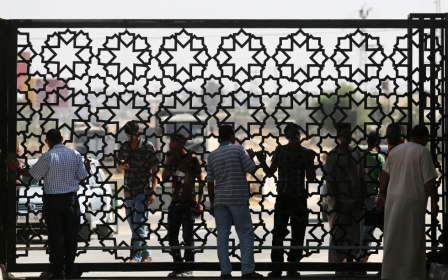In Gaza's shifting sands, resistance inevitably wins

As Gaza drapes itself in mourning for its victims of Israel's state terrorism, a spirit of triumph and determination is dominating the war-stricken people, who are writing a new defining chapter in the Palestinian national liberation struggle.
Israel has, once again, unleashed its brutal war machine against the Gazan population with the blessings of "Israel's right to defend itself," coming from the Obama Administration and many European capitals, and evidently back-channel approval from some Arab capitals - rhetoric aside - in a bid to crush Hamas and bring in the more pliable Ramallah-based Abbas regime.
After the disappearance of the three Israelis in Hebron, there was a widespread miscalculation that it was time for Israel to settle account with Hamas, who had been coming out bruised and weakened, due to losing key regional allies, financial woes and dwindling popularity, resulting from its long years of bickering with Abbas' Palestinian Authority.
Yet, somehow in Gaza's shifting sands, drawing inferences based on illusive reality can only lead to deadly consequences that cold political analyses coming from air-conditioned offices rarely predict.
In Israel and many Western and Arab capitals, their worst fears seem to have turned into a bitter reality, as they watch the scenes of jubilant Gazans celebrating victory after surviving 51 days of death, Hiroshima-like destruction of property, tribulations and horrors rained down on their heads by Israeli occupation forces. Gazans are coming out in a show of pride and appreciation for the military successes their lightly-armed resistance fighters exhibited in the battlefield.
Israel's intention of this latest aggression on Gaza was to crush Hamas and restore confidence in its deterrence abilities. But this bungled aggression has only meant further erosion of Israel's deterrence capability and has shaken to the core its longstanding security formula. Neither Israel's "mowing the lawn" military strategy nor its "map of pain" succeeded in bringing the already besieged and beleaguered Palestinians to their knees begging for an Israeli ceasefire.
To the contrary, Israel's elite forces crumbled at Gaza's doorstep, and the Palestinian resistance succeeded in hitting deep in Israel proper. Israel's founding commanders must be turning in their graves, seeing thousands of Israelis in the south leaving en masse and millions of others in shelters. The situation in Israel is one of confusion, humiliation, finger pointing, and uncertainty about what the future holds for the Jewish State.
President Abdel Fatah al-Sisi's regime in Egypt, now Israel's close ally, was in no hurry to stop Israel's barbarity, in hopes that Israel would crush Hamas. It was clearly standing in the way of a ceasefire agreement, which can be seen as a victory for Hamas, an ideological branch of Sisi's much-hated Muslim Brotherhood. Sisi's administration saw that such victory would only embolden its formidable internal foes and hence destabilise the regime.
Whether the Palestinian negotiating delegation saw the concluded ceasefire understandings in Cairo as less than what Gazans had hoped for, or the best they could get is something beside the question, considering Israel's track record of reneging on past agreements and understandings whenever it saw fit, and given the silence and complicity of key Arab states and world powers over the systematic destruction of Palestinian lives and civilian infrastructure in Gaza.
Israel has made no secret of its new forged alliance with key Arab countries, and as David Hearst aptly pointed out in recent articles, fear is at the heart of this unholy Arab alliance with Israel forged by Palestinian blood.
After nearly choking off all Arab uprisings in the region, the silence of Arab leaders over Israel's brutalization of the Palestinians is driven by fear of a resurgence of political Islam and what Hamas' victory means for the wider Arab masses across the region.
In much of the Arab and Islamic world, Palestine continues to be the unifying central cause for the Arab and Muslim nation, al-Umma, regardless of their political and ideological leanings. As millions of Arabs and Muslims around the world see how Palestinian - mainly Hamas - fighters brought Israel and its army to a state of paralysis and humiliation, this may once again rejuvenate a spirit of revolution against conditions of injustice and oppression they themselves suffer from.
Palestinian proponents of a negotiated settlement with Israel under the terms of the Oslo accords are standing to lose the most from this latest Israeli onslaught on Gaza, especially after many have seen the efficacy of armed resistance in uniting Palestinians behind a national resistance program.
Palestinian popular support for the resistance is at its highest, and the current battle has again pointed to the futility of the so-called peace negotiations that produced nothing but more colonial settlements, ghettoization of Palestinian territories, deprivation and a consolidation of an Israeli system of domination and control.
While many Palestinians believe that the siege, injustice and occupation are not going to end soon, victory in the eyes of Gazans is the very act of resistance and steadfastness in the face of a brutal and murderous Israeli military occupation regime. It was a victory of Gaza's David over Israel's Goliath.
The consequences of this latest aggression on Gaza will place the Palestinian national struggle on a totally new platform for years to come. It depends now much more than ever on the Palestinian resistance factions across the political spectrum to rally support for the continued struggle against the Israeli occupation.
- Dr Mosheer Amer is Professor of Discourse Analysis & Linguistics at the English department of the Islamic University of Gaza.
The views expressed in this article belong to the author and do not necessarily reflect the editorial policy of Middle East Eye.
Middle East Eye propose une couverture et une analyse indépendantes et incomparables du Moyen-Orient, de l’Afrique du Nord et d’autres régions du monde. Pour en savoir plus sur la reprise de ce contenu et les frais qui s’appliquent, veuillez remplir ce formulaire [en anglais]. Pour en savoir plus sur MEE, cliquez ici [en anglais].





